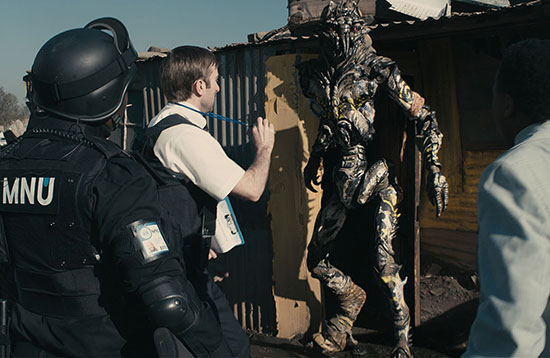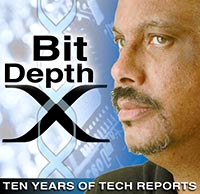BitDepth 694 - August 25
24/08/09 22:15 Filed in: BitDepth - August 2009
Neil Blomkamp's District 9 updates the science fiction conceits of Alien Nation and daubs it with a troubling patina of apatheid.
An uglier nation of aliens

Officials of the MNU attempt to serve eviction papers on a "prawn" in the film District 9.
A lot of fans of science fiction are actually devoted to it in its crudest form, the space operas that have ruled the form in television and on cinema screens. Real science fiction buffs know that the best examples of the form are remarkably cerebral and the styles that jostle to fit under the umbrella of the genre range from alternative histories, to cyber thrillers to dauntingly complicated fantasies to yes, epics of space travel and ray guns.
It is to South African writer-director Neill Blomkamp's credit that he is able to honour the better qualities of science fiction storytelling, leaving his audience thinking, while delivering a film with no shortage of weirdly chittering aliens, big funky ray guns, fireball explosions and deaths worthy of video game spatter.
Based on his 2005 short film Alive in Joburg, Blomkamp expands his six-minute vignette with surprising sureness. With a grace that's surprisingly effortless for a first feature film, Blomkamp, a 3D animator for much of his film career, merges all the little tics and flourishes that audiences have come to expect in their big "summer" adventure features with giant scoops of updates to the social consciousness message in 1988's Alien Nation.
Dubious hero
Blomkamp may have based the unfortunate experience of the aliens in this film on his experiences as a young man in South Africa, but the plot has many parallels to the earlier film. The cat food premise in District 9 has parallels in the sour milk favoured by the alien visitors in Alien Nation, as does their experience once they arrive on Earth, evaluated as useless, they are bundled off to slums for less than exemplary experiences on their new planet.
After building up an intriguing story for protagonist Wikus van der Merwe (Sharlto Copley) in the first two acts of the film, Blomkamp all but abandons his deft touch for a blunter edge in the final act, bludgeoning his audience with giant exoskeletons, showers of bloody goo and a lead actor who saves all this action adventuring by never veering far from honestly portraying the ambivalence of a government clerk thrust into a life and death situation.
In this surreal landscape, it's surprising to find that Copley's oddly unappealing portrayal, his comfort with assaying a character whose courage is largely driven by adrenaline and desperation rather than some internal character revelation, ends up defining the heart of the film.
The hero never picks up a gun until it becomes clear that his mutating hand is about to be severed and to the end, the character seems to be more in shock than in control.
Humane aliens
The prawns, remarkable CGI animations, are unshakeably unworldly, moving with a gait that's unsettling and chittering with unnerving flourishes of facial tentacles.
The residents of Johannesburg, black and white, revile the prawns. Nigerian opportunists cheat them of their equipment with cans of cat food. The Multi-National Corporation that oversees their restricted zones is both brutal and greedy, searching for a way to use the spaceship's weapons and technology, which only the prawns can activate.
The aliens, called "prawns" by the humans, as creepily chitinous as they are, seem to be the only creatures on screen with any sense of compassion or honour.
It is here, with some off-putting quai-historical allusions to the tragic history of apartheid, that the movie first stumbles in its enthusiasm to reference known racial divisions to enrich the schisms between the humans and aliens in the film. The Nigerian warlord is keen to eat his enemy to gain his power. The bad white people literally tear the aliens apart to find the secret of their DNA link to their technology. Layered on top of these cartoonish depictions are the miles of shacks, real constructs in South Africa that once housed human beings.
Even van der Merwe, when we first meet him, is nothing but an unctious, overpromoted government clerk, eager to make his name evicting the prawns, backed up by troops with all too eager trigger fingers.
It's an indicator of just how bleak and disturbing this film is on many levels is that this mewling weakling, driven by fear and self preservation, turns out to be the best that this film's relentlessly cruel humanity has to offer.

Officials of the MNU attempt to serve eviction papers on a "prawn" in the film District 9.
A lot of fans of science fiction are actually devoted to it in its crudest form, the space operas that have ruled the form in television and on cinema screens. Real science fiction buffs know that the best examples of the form are remarkably cerebral and the styles that jostle to fit under the umbrella of the genre range from alternative histories, to cyber thrillers to dauntingly complicated fantasies to yes, epics of space travel and ray guns.
It is to South African writer-director Neill Blomkamp's credit that he is able to honour the better qualities of science fiction storytelling, leaving his audience thinking, while delivering a film with no shortage of weirdly chittering aliens, big funky ray guns, fireball explosions and deaths worthy of video game spatter.
Based on his 2005 short film Alive in Joburg, Blomkamp expands his six-minute vignette with surprising sureness. With a grace that's surprisingly effortless for a first feature film, Blomkamp, a 3D animator for much of his film career, merges all the little tics and flourishes that audiences have come to expect in their big "summer" adventure features with giant scoops of updates to the social consciousness message in 1988's Alien Nation.
Dubious hero
Blomkamp may have based the unfortunate experience of the aliens in this film on his experiences as a young man in South Africa, but the plot has many parallels to the earlier film. The cat food premise in District 9 has parallels in the sour milk favoured by the alien visitors in Alien Nation, as does their experience once they arrive on Earth, evaluated as useless, they are bundled off to slums for less than exemplary experiences on their new planet.
After building up an intriguing story for protagonist Wikus van der Merwe (Sharlto Copley) in the first two acts of the film, Blomkamp all but abandons his deft touch for a blunter edge in the final act, bludgeoning his audience with giant exoskeletons, showers of bloody goo and a lead actor who saves all this action adventuring by never veering far from honestly portraying the ambivalence of a government clerk thrust into a life and death situation.
In this surreal landscape, it's surprising to find that Copley's oddly unappealing portrayal, his comfort with assaying a character whose courage is largely driven by adrenaline and desperation rather than some internal character revelation, ends up defining the heart of the film.
The hero never picks up a gun until it becomes clear that his mutating hand is about to be severed and to the end, the character seems to be more in shock than in control.
Humane aliens
The prawns, remarkable CGI animations, are unshakeably unworldly, moving with a gait that's unsettling and chittering with unnerving flourishes of facial tentacles.
The residents of Johannesburg, black and white, revile the prawns. Nigerian opportunists cheat them of their equipment with cans of cat food. The Multi-National Corporation that oversees their restricted zones is both brutal and greedy, searching for a way to use the spaceship's weapons and technology, which only the prawns can activate.
The aliens, called "prawns" by the humans, as creepily chitinous as they are, seem to be the only creatures on screen with any sense of compassion or honour.
It is here, with some off-putting quai-historical allusions to the tragic history of apartheid, that the movie first stumbles in its enthusiasm to reference known racial divisions to enrich the schisms between the humans and aliens in the film. The Nigerian warlord is keen to eat his enemy to gain his power. The bad white people literally tear the aliens apart to find the secret of their DNA link to their technology. Layered on top of these cartoonish depictions are the miles of shacks, real constructs in South Africa that once housed human beings.
Even van der Merwe, when we first meet him, is nothing but an unctious, overpromoted government clerk, eager to make his name evicting the prawns, backed up by troops with all too eager trigger fingers.
It's an indicator of just how bleak and disturbing this film is on many levels is that this mewling weakling, driven by fear and self preservation, turns out to be the best that this film's relentlessly cruel humanity has to offer.
blog comments powered by Disqus

